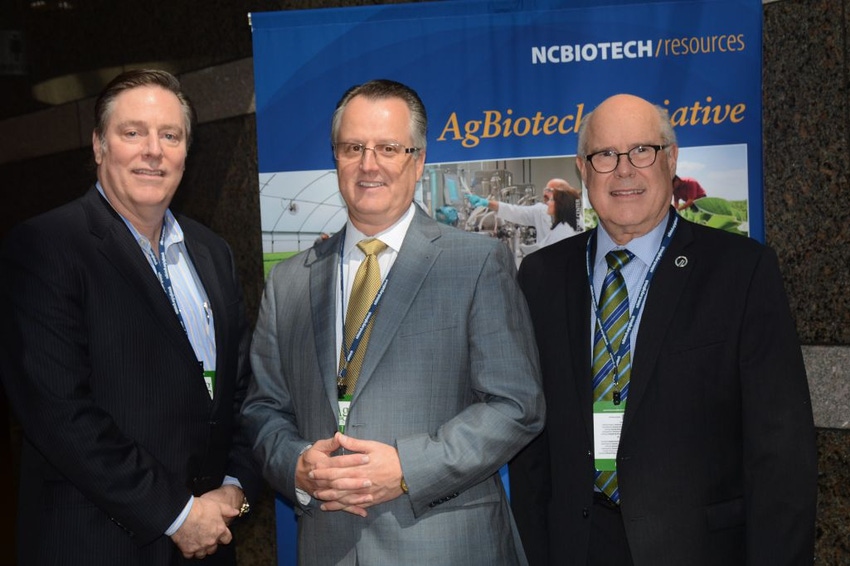
Food in America is safer, more available and more affordable than ever before. Yet despite all of this, consumers remain skeptical of the technology necessary to feed the world.
Charlie Arnot, chief executive officer of the Center for Food Integrity, says this presents a great challenge to agriculture today and steps must be taken to engage consumers so they will see the need and benefits of technology in agriculture and food production.
“People are skeptical of institutions, and food and agriculture has become an institution,” Arnot said Sept. 28 at the Ag Biotech Summit sponsored by the North Carolina Biotechnology Center at the Friday Center at the University of North Carolina, Chapel Hill.
In the age of social media, mistrust of institutions has become the norm. Arnot said transparency is no longer optional. Steps must be taken to build trust.
“It is a basic consumer expectation for the entire system. It doesn’t make any difference whether you’re on the farm, you’re a food processor, a technology company, a restaurant or retailer, people want you to be more transparent,” he said.
“If you’re not transparent, either you don’t have a good story to tell or you have something to hide. In ag, it’s going to be a cultural challenge for us because our mantra has always been ‘we have nothing to hide, but it’s none of your business.’ We have to get over that. We have to be much more willing to share who we are and what we do in a way that protects the intellectual property and all of the things you are working on. But in that concept, we have to find ways to be more transparent,” Arnot emphasized.
Arnot said there are three elements of building trust: influential others, family and friends and credentialed individuals people respect. In the past, agriculture has primarily relied on credentialed individuals to build trust.
“We operated under the assumption that the public is going to be logical and rational. If you simply give them enough data, they’ll come to our side of the argument. If they’ve not yet come to our side of the argument, it must be that we’ve not given them enough data so we’ll go do some more research. If they still haven’t come to our side of the argument, we’ll go do some more research. And we’ve repeated that pattern for decades, assuming that there’s some magic combination of data, of science and numbers that we can give people where it will simply overwhelm the scales and they will come to our side of the argument,” Arnot said.
Arnot emphasized the importance of shared values in building trust. He said consumers are asking “can I count on you to do what’s right?”
The Center for Food Integrity recently completed a three-year survey of 6,000 consumers where they were asked questions about sustainability, on-farm practices, worker treatment, food safety, nutrition and other issues. “We found that shared values are three to five times more important than demonstrating technical competency in building trust,” Arnot said.
He said this is important to remember in such hot button issues as genetically modified grains and animal welfare. “Historically our response has always been that science says we can. But can and should or not the same question. Can is a question about competency. Should is a question about values and ethics,” he said.
Scientific verification cannot be substituted for ethical justification, he said. They are entirely separate concepts. Arnot said giving people more information about science and economics to increase their knowledge does very little to influence how they feel or what they believe. “People are much more likely to make their decisions based on how they feel and what they believe and not simply what they know,” he said.
In today’s digital age, people are more engaged to seek out information that is most relevant to them. Due to social media, communication is now much more insular and tribal, Arnot said.
“The way people are accessing information today is from online sources, from family and from others. They synthesize all of those sources of information in a way that is aligned with their values to create a new opinion and to create a belief around whatever the issue happens to be,” Arnot explained.
Arnot told the story of a woman named Heidi who was part of a consumer panel convened by the Center for Food Integrity in Orlando, Fla. In the panel, she expressed concern about the safety of genetically modified organisms and was asked how she came to the conclusion that GMOs aren’t safe.
“She said she is part of a mom’s group,” Arnot. “That’s a big consensus. You don’t need doctors and scientists confirming it when you have hundreds of moms. That’s our reality today; that’s the world in which we live: where it is the mom’s group and Heidi and her social group that are going to determine whether or not you or able to use that technology.”
Arnot said engaging consumers requires talking about shared values, citing the quote by Theodore Roosevelt, “People really don’t care how much you know until they know how much you care.”
“You have to open the digital door to biotech,” Arnot said. “You have to find ways to make it relatable and make a connection with people to give them an opportunity to understand the larger societal benefits of the work you are doing and find ways to do that that still allow you to protect your intellectual property. That’s not an impossible problem to solve but you have to be committed.”
About the Author(s)
You May Also Like






